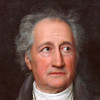“ If the great end be human happiness, Then Nature deviates; and can man do less? ”
Alexander Pope, An Essay on Man (1734). copy citation
| Author | Alexander Pope |
|---|---|
| Source | An Essay on Man |
| Topic | happiness |
| Date | 1734 |
| Language | English |
| Reference | |
| Note | |
| Weblink | http://www.gutenberg.org/files/2428/2428-h/2428-h.htm |
Context
“But errs not Nature from this gracious end, From burning suns when livid deaths descend, When earthquakes swallow, or when tempests sweep Towns to one grave, whole nations to the deep? "No, ('tis replied) the first Almighty Cause Acts not by partial, but by general laws; The exceptions few; some change since all began; And what created perfect?"--Why then man? If the great end be human happiness, Then Nature deviates; and can man do less? As much that end a constant course requires Of showers and sunshine, as of man's desires; As much eternal springs and cloudless skies, As men for ever temperate, calm, and wise. If plagues or earthquakes break not Heaven's design, Why then a Borgia, or a Catiline?”
source


